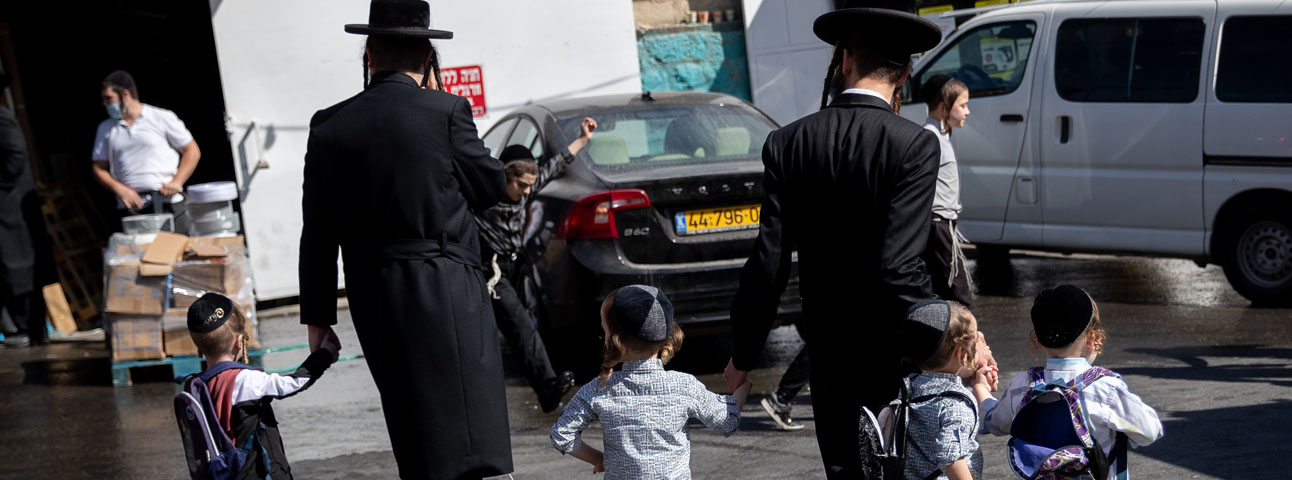An Organized Civil Disobedience Campaign
Rabbi Kanievsky’s decision to disregard the law and open ultra-Orthodox schools is the first time in Israeli history that we are seeing something that approaches a call for mass civil disobedience orchestrated by a key public figure.

Flash 90
Something big and very disturbing in the history of Israeli democracy took place this week. The directive issued by Rabbi Chaim Kanievsky, the leader of the non-hassidic (Lithuanian) ultra-Orthodox community to flout the law and open up elementary schools for boys (Talmudei Torah), is the first time in Israeli history that we are seeing something that approaches a call for mass civil disobedience. That is, an outright call for nonviolent action in defiance of the law, motivated by values and a moral conscience issued by a key public figure, and aimed at generating change in the law or in government policy through the use of undemocratic means.
This is a new chapter in our history, since even though we are a tribal and splintered society, we have never experienced organized civil disobedience of this sort. At the time of the Gaza disengagement, the leaders of the “Orange” camp were careful not to call on their followers to rip apart the shared social fabric, even though many among them were torn in two, as they watched their life’s project collapse. We’ve seen Israeli Arabs turning out for stormy demonstrations. But even on Land Day – when blood was shed – their leaders did not call for civil disobedience. We’ve seen rowdy and unruly demonstrations, protests and strikes, but these were not led by a major public figure instructing his followers to break the law, with the aim of bending the Knesset to his will.
This time, things are different. The “leading sage of our generation” who issued the order for mass lawbreaking is not the leader of some fringe group. He wields substantial authority, exceeding that of the elected government, for close to half a million Israelis. Even those like me who respect the ultra-Orthodox minority’s right to “freedom of religion” and “freedom of culture” are duty bound to sound the alarm about the profound implications of the rabbi’s radical step for the future of Israeli democracy.
It is important to emphasize that the ultra-Orthodox are not interested in rebelling against the state, nor are they indifferent to the welfare of the general public. We must not forget the civic responsibility they take upon themselves through the charitable and emergency medical organizations that we all rely on.
Nevertheless, Kanievsky’s current stand is extremely dangerous. It provides every sector of our fragmented society with an example of a civil disobedience campaign aimed at bending the rule of law. It does away with what until now has been a mental block denying the possibility of a frightening escalation of the Israeli Kulturkampf. It undermines our very ability to continue to disagree while accepting the rules of the game, at the core of which is the rule of law. The rabbi may emerge victorious in this battle; but he and his followers, as well as Israeli society as a whole, are liable to lose the war.
How should a Jewish and democratic state, with the will to live and with respect for minorities, respond to this challenge? There is no point in imposing sanctions on the rabbi and his followers. Doing so would merely turn them into martyrs and escalate the struggle. Nor would levying repeated fines against rank-and-file members of the ultra-Orthodox community be fair, given the quandary in which they find themselves as individuals. Dispatching riot squads against schoolchildren would only weaken the rule of law. But we should – and I believe we must – take unfaltering and significant action against this organized civil disobedience. In addition to a public information campaign tailored to and targeted at the ultra-Orthodox; the enlistment of municipal ultra-Orthodox leadership in the efforts to control the pandemic, using methods suited to the specific conditions in their localities, a stinging economic whip should be wielded at once against institutions and organizations identified with and complying with the organized civil disobedience campaign, and all government support for them should be suspended for a protracted period. This whip should also be wielded – on the basis of clear criteria – against ultra-Orthodox local authorities supporting the lawbreakers. If you turn your back to the state, the state will turn its back on you.
Such a sanction will be feasible and effective only if we recognize that political considerations have absolutely no place when we are dealing with saving lives. And the sanctions will be justified only if they are not accompanied by rabid incitement against the ultra-Orthodox. We are brothers and sisters, even if our values sometimes clash.
The article was published in the Jerusalem Post.
